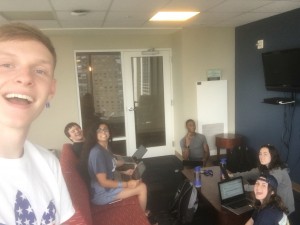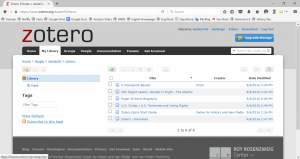This is the view of Atlanta from my dorm room at GSU. I remember when I first walked in on move in day me and my parents were taken aback by this wonderful view. I really lucked out. It looks even better at night but I just had to take a picture of the skyline at sunset yesterday because it really was something I want to remember. The picture of course, taken on my 4 year old phone, doesn’t really capture the full beauty of the scene but I did my best. Things like this view really make me appreciate going to school at GSU. Living in and going to school in the heart of a city, and not just any city but the city of Atlanta has been such a fun and eye opening experience for me. I came from the relatively small town of Johns Creek, GA where the tallest building was maybe a third of that of Atlanta. Not to throw the old JC under the bus (it really isn’t that bad) but lets just say living in downtown Atlanta is a completely different experience in a very good way.
Study Group Reflection: September 12
After classes today, a few of us got together to work on our class prep assignment, the first annotated bibliography. It took us a while but I think we all understood what we had to do as a result. Working with the group in a more laid back, non-classroom setting allowed me to really get a feel for how others in the cluster were doing. We discussed upcoming projects not only for Dr. Wharton’s class but for all of the classes we shared. I have to say these study group meetings are really helpful for anyone who needs help understanding assignments. And for me, I walked away feeling a little less stressed because I realized that many of the people in the cluster often felt as equally confused as I was. But coming together and hashing things out in a focused environment cleared a lot of things up for all of us. I definitely recommend grouping up and solving your problems with others rather than by yourself. This applies not only for us GA State cluster students but for anyone facing problems whether it be school, work, or just life in general. Good luck!
SOS: Built Environment Description
The link for the list of eligible sites we can visit for the project goes to a “404 Not Found”, what are the sites? Are they the same as the ones we have listed for our annotated bibliographies?
Zotero Library
I’ve already found Zotero.org really useful for annotations and bibliography. It’s kind of insane that this program has been around and students don’t know about it. Here are a few of the articles I’ve already saved with it.
Class Notes – September 1st
What makes a good annotation?
-One that asks a question (activate others’ thinking)
-answer that question
-make connections
-analyze arguments
-bring more to the text
-explain something for someone else
-provide insight
—————————-
All of these together make up a good, capital RA, Reading Annotation.
Requirements
at least 10 annotations per RA
use correct grammar and punctiaution
Hashtags: class hashtag (#atlsprf16H), your initials (#ks), reading number (#RA1 #RA2 ect.), last name of author,
Map of today’s tour to the Civic Center
Submission Form
Syllabus Quiz
What are the major projects? In a bulleted list, provide links to the project descriptions for each of them.
- First Two: http://atlspaceplacerhetf16.robinwharton.net/syllabus-course-info/#ProjectsRow1
- Second two: http://atlspaceplacerhetf16.robinwharton.net/syllabus-course-info/#ProjectsRow2
How will your final grade be calculated?
We earn points with through completing major projects and extra credit. No points are subtracted. You get the points you earn.
What is the “submission form” and how do you use it? Embed the form below your answer (hint: Google “embed Google form” to find out how).
Where on the course website can you find an overview of what’s due and the readings for each unit?
What is the best way to see an overview of what’s due each week?
Go to Calendar tab and then weekly overview.
What is the attendance policy?
Earn points for coming to class and lose points for unexcused absences. Excused absences are limited to university-sponsored events where you are representing GSU in an official capacity, religious holidays, and legal obligations such as jury duty or military service days. Absences for all other reasons will result in a points deduction as outlined above. In the event of extended illness or family emergency, requests may be considered for individual exemption from the general attendance policy on a case by case basis.
What are the two ways you can lose points?
Unexcused absences and missed class prep assignments.
What are my office hours, and how do you make an appointment to see me outside of class?
Office Hours: T/Th 9-11 am, and by appointment; by appointment via Skype or Google Hangout if that works better than an in-person conference
Contact: rwharton3@gsu.edu
How do you earn participation credit? Provide a link to the instructions/guidelines for participation.
How many points can you earn by participating in or organizing a study group session?
25
How can you be assured of earning an “A” in this course?
Complete all of the major projects, miss no more than four class meetings, and accrue 2,800 points
What are the minimum requirements for earning a passing grade of “C”?
Complete all of the major projects, come to class prepared, and miss only four class meetings
What do you do if you’re not sure how to document your participation in order to earn points?
If you ever have questions about what kind of evidence you need to provide to document your participation and how to submit it, stop by during office hours or ask the question before or after class. You’ll earn points for the office hours visit, asking the question, and for finding a way to make the information available to the rest of your classmates.
What are the Unit 1 readings and which one would you like to annotate for Reading Annotation 1?
Thomas Carter and Elizabeth Collins Cromley, “Introduction,” from Invitation to Vernacular Architecture
James Deetz, “Parting Ways,” from In Small Things Forgotten: An Archaeology of Early American Life
Stephanie Fitzgerald, “The Cultural Work of a Mohegan Painted Basket,” from Early Native Literacies in New England: A Documentary and Critical Anthology



